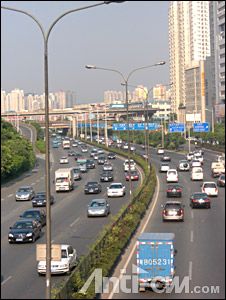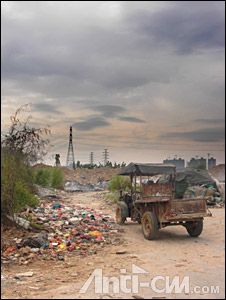|
|
Harrabin's Notes: China's vulnerability
| Roger Harrabin examines the difficulties faced by China as it puts together a negotiating position for the Copenhagen climate conference.
|
Many scientists consider China to be the most vulnerable of all the major nations to climate change.
If that's so, it doesn't bode well for Liu Xuedu and her family.
We find Liu by following the plaintive sound of a woman's unaccompanied song at Fengnan village in the Pearl River delta in China's deep south.
She sits in her one-roomed house intoning a song of mourning for her son, killed in a car crash whilst working in the local town four years ago.
There are gaps in the stone walls, and a bare concrete floor. The house is almost empty except for a couple of bits of primitive farm machinery against the wall and painted wooden flowers that adorn the shrine to her son on a table in the corner.
Her daughter-in-law tends to the small family farm, though it's a drought-stricken area and income is very low.
Liu is left looking after her young grandchildren who squall as we try to speak to her. She has diabetes but can't afford the medicine. Like hundreds of millions of Chinese she's locked into poverty by dependency on the climate.
"Last year, we had no rains at all," she tells me. "This year we've just had rain but the way things have been looking these past few years, we don't expect any more in the Spring.
"We can barely get by on what we earn."

The Pearl River delta is earmarked as one of China's most vulnerable areas to a changing climate. Parts of it regularly face both droughts and typhoons in the same year.
The delta - home to tens of millions of people - is very low-lying, so it's also vulnerable to sea level rise - especially as ground water has been over-extracted in a way that's made the land sink further.
Farmers are making the problem even worse by drilling more than 100m for precious sweet water. That in turn is sucking salty water from the sea bed, and starting a slow destruction of the farmland.
"Climate change is a big worry for China's politicians," says Zhou Yong Zhang, environment professor at Sun-Yat Sen University in nearby Guangzhou. "In south China, we worry about sea level rise because it will have a big impact on us. We also worry about the extreme weather.
"The west of China is a problem because the weather patterns there are already very complicated and it looks like they are getting more difficult. They also have the melting glaciers. But maybe the north of China will benefit from more rain. There is a lot of uncertainty still.
"Some geologists in China say we are only seeing natural swings in weather patterns. But many climate scientists think China is suffering the effects of (human-induced) climate change already."
Talking targets
China's President Hu Jintao and Premier Wen Jiabao have both spoken forcefully on the need to curb global emissions of greenhouse gases.
But they are in a bind. They need to increase the economy to help lift people like Liu out of poverty - and there are hundreds of millions of people like her on less than $2 a day.

Downtown Shenzhen looks much like any large US city
China, like other emerging nations, demands that rich countries cut 40% of their emissions (based on 1990 levels) by 2020 in line with recommendations of the Intergovernmental Panel on Climate Change (IPCC).
As China's emissions are still relatively low per capita, and as China is the workshop for developed nations, the rest of the world accepts that China's own emissions will continue to grow for a time… but the rest of the world would like to know exactly when China will stop growing.
The Chinese government has so far only promised to peak emissions by 2050 - that's catastrophically late from the point of view of climate modellers. But other dates are now on the table.
Prof Hu Angang, one of many academics who advises the government on energy, is quoted as saying that China's emissions could peak as early as 2020. But his controversial remarks have handed ammunition to China's rivals in the forthcoming Copenhagen climate talks.
Green push
The 2020 peak appears not to have wide support among academics in China but a modelling exercise published recently by three respected organisations - the Energy Research Institute (ERI), Qinghua University, and the State Council Development Research Centre - concludes that emissions could peak between 2030 and 2040.
The founder of the ERI, Yang Fuqiang - now a global technology expert for WWF - warns that it might be counter-productive for China to strive to cut emissions from 2020. The country will need maybe a decade with stable emissions and rising profits so it can develop the technologies for a truly low-carbon future, he told me.
"I think 2030 is ambitious, but we can do it. We have to take more action. It's very urgent - 2030 is only 20 years away, so hard decisions need to be taken now," he said. "The government needs to work harder - issue more policies, have more investment in clean technology, and ask the public to be more aware of climate change."
The Chinese government is already beginning to edge towards the low-carbon direction with a dual-purpose strategy that conveniently improves the competitiveness of the economy as well as cutting emissions. In fact, it is almost impossible to tell industrial policy and environment policy apart.
The central government has spent more fiscal stimulus money on green technology than any other nation - US$221bn, according to HSBC.
Patent pain
Another energy efficiency target will be announced in the next five-year plan. There is a renewable energy target of 15% by 2020, which the well-connected Yang Fuqiang expects to be increased to 16% or 17% before the Copenhagen meeting. These odd percentages have huge impact.

On the outskirts of Shenzhen, the "old China" is still very evident
China is already a major global market for renewables. Wind power capacity has been doubling yearly for the past five years and China looks likely to become the world's biggest wind market - above the US. China complains, still, that the patents for key technologies like gear-boxes are held in the West so it can't develop its wind industry as far as it would like to.
China looks likely to become the world's biggest maker of solar photovoltaic cells, and it is already the biggest player in solar water heaters, which are mandatory on new homes in the Shanghai area.
China plans to double its nuclear power capacity, too, in a strategy that sounds ambitious overall. Indeed it is… but it can't disguise the bigger truth that China will still remain about 70% dependent on coal as its economy booms, and carbon capture and storage is advancing at a snail's pace.
What's more, questions remain about whether all of China's targets can be met.
Coal question
The central government has mandated a 20% improvement in energy efficiency by 2010. But that may founder because provincial governments and state-owned enterprises often see more political and financial advantage in diverting the river of investment money flowing into China towards polluting heavy industries.
Regional politicians compete with each other to attract the cash. They have been warned that they will damage their promotion prospects if they miss their efficiency targets, but many owe more loyalty to local profits and jobs.
Ailun Yang of Greenpeace sympathises with China's top leaders, but says they have to do more.
"I believe that Hu and Wen are both serious about the need to reduce emissions. But they have to carry the rest of the political system with them and that's not always easy - especially when provinces are competing with each other to attract jobs and inward investment.
"The government has changed the tax system, putting more tax on energy-intensive products since 2007. It is also increasing environmental standards. It also made a good decision to bring in targets for carbon intensity (a measure of CO2 per unit of economic growth).
"But its downfall is coal. The industries around coal are massively powerful and coal still does not remotely pay back the costs it imposes on society through pollution and safety."
China's intensity target will be a major bargaining chip at Copenhagen. It's a measure that George Bush originally proposed for the US because it steers an economy in a low-carbon direction without actually guaranteeing any emissions reductions at all.
It's worth mentioning that there are two ways of improving carbon intensity: either by reducing CO2 with the same product, or keeping CO2 levels the same or higher but switching to a higher-value product.
There will be pressure on China to make a grand statement at Copenhagen to impress the US public that its own economy has to shift direction. But in truth, there's an overwhelming feeling among negotiators in the climate talks that it's the US, not China, which has to move most.
In Tuesday's Harrabin's Notes, I'll have my hands on the Chinese car that might - just might - create an electric revolution on the roads.
Later in the week, I'll be visiting what's claimed to be the world's most energy-efficient tower block; seeing how one city has banned the petrol motorbike; and taking a cycle ride along country tracks to witness the beggar-thy-neighbour boom in ostentatious rural housing. |
BBC, China, Harrabin, Notes, BBC, China, Harrabin, Notes, BBC, China, Harrabin, Notes
评分
-
1
查看全部评分
-
|